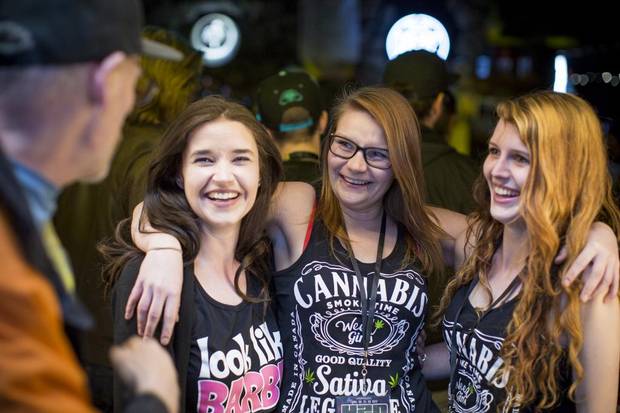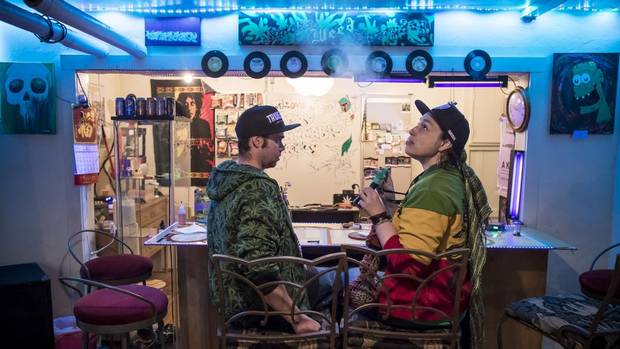Nathan Adams stands behind a bar, looking like a mixologist tending to fussy cocktail enthusiasts who order French 75s and charred pineapple mojitos. The bar is stocked with the necessary tools to please these particular patrons: a press to squeeze plants, a blowtorch, custom hand-blown glass vessels made by local artists.
This bar is for members of an underground society. Here, folks consume cannabis rather than Kahlua. This is Mr. Adam's basement. This is a smoke lounge. This is the Calgary Cannabis Society's headquarters.
And this is legal, Mr. Adams says as he uses a hydraulic press from Canadian Tire to squeeze a handful of marijuana buds between parchment paper. He is extracting resin.
Read more: As legalization looms, Toronto marijuana dispensaries aim to evade scrutiny
Globe editorial: While waiting to legalize pot, why not decriminalize it in the meantime?
Tabatha Southey: Stirring the pot legislation
"Most people here are carded medical users," he says. Most. Those who are not possess and consume cannabis at their own risk.
Provincial and municipal governments across Canada are prepping regulations to govern recreational cannabis use – rules that must be in place by July 1, 2018, when adults can legally use the drug.
The Calgary Cannabis Society (CCS) wants governments to consider this residential basement filled with friends a legal establishment frequented by patrons. It wants officials to consider it legitimate and it wants to make a profit. Indeed, Canada's recreational- and medical-marijuana markets could be worth a combined $9-billion by 2024, according to industry participants.
How Canadians can access legal marijuana and where they can consume it will be at the centre of the debate among provinces, who must come up with their own regulations. Right now, for example, Alberta shuts down dispensaries. In British Columbia, municipalities license such operations. This means, depending on perspective, Alberta is either behind on forming regulations or is starting the process with a clean slate.
Alberta intends to consult residents this summer as it writes legislation.
The province wants input on what the legal age for use should be and where cannabis can be sold, Kathleen Ganley, Alberta's Minister of Justice and Solicitor General, said after the federal government tabled its marijuana legislation.
It is unlikely, Ms. Ganley said, that Albertans will be able to purchase cannabis and alcohol at the same shop.
"Albertans will have an interest in terms of where those stores go," she told reporters.
The provincial government will also examine how Vancouver and other cities in British Columbia are addressing illegal dispensaries, Ms. Ganley said.
"It's always good to look to people who have dealt with situations before, so it's certainly worth looking at those decisions in other jurisdictions. [Alberta staff] have been looking at other decisions made in jurisdictions in the U.S., as well, for lessons they've learned in that process," she said.
"One of the main messages we got from Colorado was it's easier to start out with more regulations than to try to regulate after the fact."
Everyone – from big-time investors using phrases such as "free market" and "industry," to medical users who do not want to be forgotten, to advocates who worry potheads will crowd children out of playgrounds – wants a say.

Kelly Gibson, left, Arielle Crowe, milddle, and Vinnie Young – members of the WeedGirls – celebrate during 4/20 events in Calgary.
Chris Bolin/For the globe and mail
Edmonton and Calgary are already picking away at the process. Edmonton, for example, proposed new zoning classifications for "cannabis retail sales" and "cannabis lounges." The intent is to separate these two from other zones, such as general retail stores and bar and neighbourhood pubs. The draft amendments will be presented at a city-council public hearing on June 28.
Calgary, prior to the federal government announcing plans to legalize cannabis use, said it wants to restrict "growing of marijuana in people's homes" for safety and quality-of-life reasons. "As such, we want to ensure consideration is given to important factors like ventilation standards and property values," the city says on its website. Calgary wants a share of federal tax revenue and the authority to regulate.
Chuck Rifici is a former chief financial officer for the federal Liberals and now runs Nesta Co., a private-equity firm focused on making money in the cannabis industry. Mr. Rifici founded Canopy Growth Corp., a medical-marijuana producer and distributor with a market capitalization of about $1.5-billion on the Toronto Stock Exchange. He wants the free market to guide governments.
"I would like to see Alberta enable a highly regulated, competitive, for-profit industry of retailing and allow entrepreneurs and the market to do what they do best – compete," he says. Ideal rules will be a result of evolution rather than flawless legislation on the first day, Mr. Rifici says.
"There will be many different models that people will propose and I think over time best practices will emerge. But we need to start somewhere and I think it is more important to start with something rather than try to start with something perfect."
Back at CCS headquarters, Mr. Adams and his partner, Lisa Kirkman, mingle in the lounge. Ms. Kirkman wears a bong around her neck in public because authorities, she says, are more likely to assume she's licensed to use cannabis if she is open about it rather than smoking a pipe in an alley.
Ms. Kirkman is CCS's president and Mr. Adams is the vice-president. CCS, they say, is close to receiving official society status under the law. Visitors must be 18 here. The couple does not permit drug sales. They rent this house – it is near 4th Street and 20th Avenue SW – and sublet the basement to CCS. They ask visitors to chip in $10 when they drop in, or perhaps a donation to the food-bank box at the entrance to the den.
Mr. Adams finishes pressing resin from the chunky marijuana buds. Resin sticks to the parchment paper. He takes the sticky product to Corey Miller, who sits at the end of CCS's "dab bar." Mr. Miller takes a deep breath, smelling the resin. "Nice. Very nice. Very terpy. Very piney. Very good," he says.
With a report from Mike Hager in Vancouver
MORE FROM THE GLOBE AND MAIL

